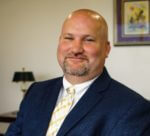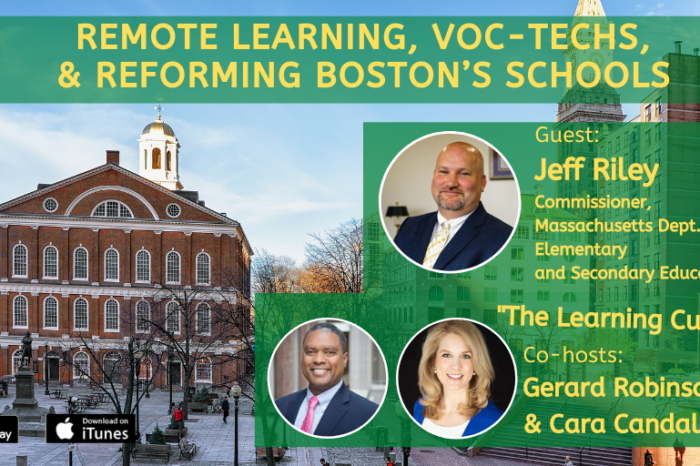MA Commissioner Jeff Riley on Remote Learning, Voc-Techs, & Reforming Boston’s Schools
This week on “The Learning Curve,” Cara and Gerard open with commentary on the George Floyd tragedy and K-12 education’s role in addressing racial injustice. Then, they are joined by Jeffrey Riley, the Massachusetts Commissioner of Elementary and Secondary Education, to talk about the unprecedented challenges of COVID-19. Commissioner Riley walks them through the remote learning guidance he issued, the timeline since the closures in March, and efforts to meet financial and technological obstacles in different parts of the state. He discusses work to acclimate teachers to online learning platforms, and options for re-opening in the fall. He also shares an innovative program that he launched in Lawrence that is now available in other parts of the state to respond to the growing demand for vocational education. Lastly, they delve into how to improve the Boston Public Schools, the subject of a recent audit warning about graduation rates, facilities, and academic performance, with 30 of the district’s schools ranking in the bottom 10 percent statewide.
Story of the Week: Cara and Gerard reflect on the George Floyd murder, police brutality, and racial injustice across America, and the important role of school leaders and teachers in facilitating constructive dialogue. How can education policymaking help with this ongoing crisis? They discuss the benefits of increasing access to high-quality educational opportunities and early literacy programs; engaging in conversations about our broken criminal justice system; improving the preparation of police officer candidates; and ensuring that people of all races feel empowered to speak up in support of human dignity and against injustice.
Related commentary:
- Commonwealth Magazine op-ed: Mass. schools must recommit to knowledge-based curriculum
- WGBH News op-ed: Easthampton High Scores A National Educational Victory During The COVID-19 Pandemic
The next episode will air on June 12th, 2020 with guest Carole Boston Weatherford, a New York Times best-selling children’s book author, and and Caldecott Honor Book and Coretta Scott King Award winning biographer of Harriet Tubman and Fannie Lou Hamer.
Newsmaker Interview Guest:

Jeffrey Riley is Massachusetts’ 24th Commissioner of Elementary and Secondary Education. Commissioner Riley’s experience spans urban and suburban districts and includes teaching in Baltimore, Maryland; and in Massachusetts, being principal of Tyngsboro Middle School; and of Boston’s Edwards Middle School. From 2012 until spring 2018, Riley served as superintendent-receiver of the Lawrence Public Schools. Riley holds a bachelor’s degree in philosophy from Pomona College in California, a master’s degree in counseling from Johns Hopkins University, and a master’s degree in school administration, planning, and social policy from Harvard University.
Newslink:
Chalkbeat: ‘Moments like now are why we teach’: Educators tackle tough conversations about race and violence — this time virtually















